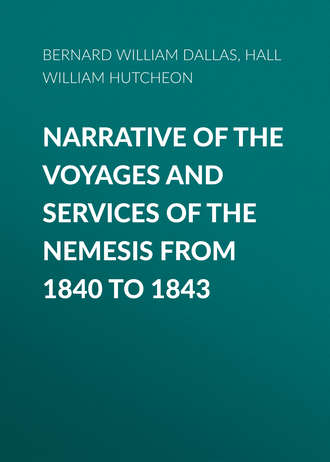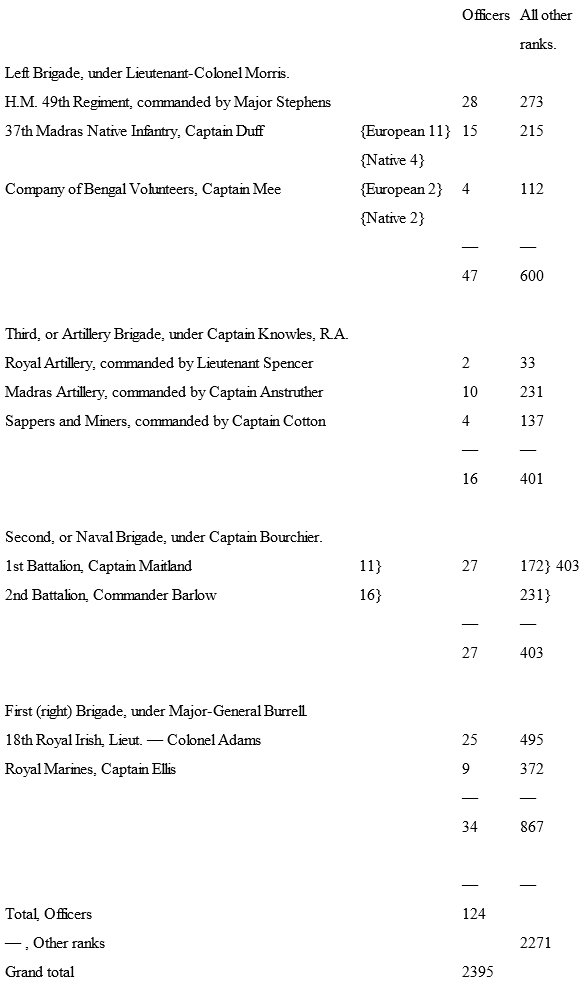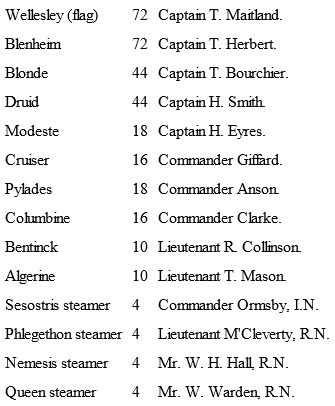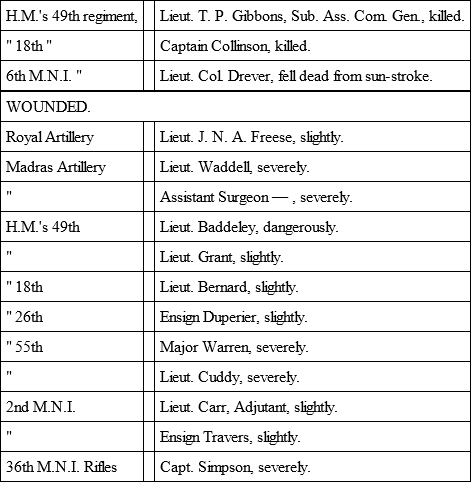 полная версия
полная версияNarrative of the Voyages and Services of the Nemesis from 1840 to 1843
Generally on these occasions the water was shallow, so that it was necessary to raise both keels of the vessel, and also the drop-rudder, and therefore it was sometimes extremely difficult to steer her under those circumstances, and the use of the kedges became the more necessary. In the present instance a space of twenty-two feet was opened, and the
41
It should be here mentioned, that Capt. Larkins, who formerly commanded one of the East India Company's vessels, and had been long acquainted with the Chinese character, volunteered his valuable services upon the occasion.
42
The vessels engaged were the
Modeste, Commander Eyres; Algerine, Lieut. Mason; Starling, Lieut. Kellett; Herald, Capt. Nias (later in the day;) Hebe and Louisa Tenders, Mr. Quin and Mr. Carmichael;
Together with the steamers
Nemesis, W. H. Hall, R.N.; and Madagascar, Mr. Dicey.
A large flotilla of boats, from the squadron generally, was placed under the command of Captain Bourchier assisted by Captain Bethune, and was formed in four divisions, three of which were under the orders of Commanders Barlow and Clarke, and Lieut. Coulson, and the fourth commanded by Captain Belcher and Captain Warren. The whole together must have amounted to little less than forty in number. Upwards of fifty naval officers took part in the operations of this large flotilla alone; the services of which were likely to be of the greatest importance in capturing and destroying the immense flotilla of Chinese boats, of all forms and sizes, which had been pressed into the service of the government for the defence of Canton.
43
The despatch was believed to relate principally to the supposed death of Captain Stead, of the Pestonjee Bomanjee transport, who had been attacked, and was supposed to have been murdered, near Keeto Point, on one of the islands near Chusan, after the restoration of that island to the Chinese. He landed, to make inquiries, being in ignorance of what had happened, and surprised to see Chusan harbour in possession of the Chinese.
44
Namely, the Pylades, Algerine, Nemesis, and Louisa cutter.
45
Boats of the Calliope, Herald, Modeste, Pylades, and Algerine.
46
See the accompanying map of the Canton river.
47
The following concise description is taken from the personal remarks of several who were present, and from public documents.
48
FIELD LIST OF TROOPS ENGAGED ON THE HEIGHTS ABOVE CANTON ON THE 25TH OF MAY, 1841.

N.B. – It is to be remarked that the company of Bengal Volunteers, comprising one hundred and twelve men, had only two European officers.
49
Names of officers: – Captain Hall, Mr. Whitehurst, and Mr. Gaunt, Nemesis; Mr. Goss and Mr. Hooper, H.M.S. Sulphur; Mr. Holland and Mr. Lambert, H.M.S. Blonde.
50
Only two of the percussion-muskets of the marines missed fire, although they had been loaded two or three days before, without having been discharged since. The men belonged principally to the Blenheim, under Lieutenant Whiting.
51
It is impossible for us to know exactly what communication was made by the Chinese officer, to the heads of these patriotic bands, but it was thought that the people did not withdraw altogether owing to the conviction that their efforts would be useless against us, but because they were bound to obey the orders of the prefect. At the same time, they really believed that they had been betrayed by their own authorities, and were ready to unite again whenever occasion offered with some confidence of success.
52
Lieut. C. Fox, R.N., and Mr. Kendall had each a leg shot off; the former died.
53
A glance at the accompanying map will sufficiently indicate the peculiar form of the island.
54
Since the commencement of the present year, 1844, the sickness has nearly disappeared.
55
The northernmost point in Europe where rice is cultivated, is, I believe, the neighborhood of Milan. But, even there, none is permitted to be grown within a circuit of several miles of the city, owing to the unhealthiness which it would produce.
56
List of H.M. ships and vessels, and of the Honourable Company's steam-vessels, in action at Amoy, 26th of August, 1841.
List of H.M. ships and vessels, and of the Honourable Company's steam-vessels, in action at Amoy, 26th of August, 1841.

57
The information in the text was extracted from the manuscript, more than a year ago, in China. But the journals of Mr. Gully and Captain Denham have been recently published in full, in this country.
58
Probably the women at Formosa are much less numerous, compared with the men, than in most other places. The men come over from the mainland, but do not bring their women. It is believed that infanticide of female children is very prevalent at Amoy. The men are driven by poverty to emigrate, and have no means of providing for female children, who are therefore frequently smothered or drowned.
59
To shew how sickly the coast of China is, in some seasons, it may be mentioned, that on board the Lion, which conveyed Lord Macartney's embassy to China in 1792, no less than ninety-three men were put upon the sick list in less than a week after she came to anchor on the upper part of the east coast.
60
In some of the most barren parts of Tartary, where the people with difficulty obtain the means of subsistence, remarkable care is bestowed upon the cultivation of patches of ground, only a few yards square, upon the side of the most rugged mountains. Æneas Anderson says, "Upon a very high mountain in Tartary, (on the road to the imperial residence,) I discovered patches of cultivated ground in such a position as to appear altogether inaccessible. Presently I observed one of the poor husbandmen employed in digging a small spot near the top of a hill, where, at first sight, it appeared impossible for him to stand, much less to till the ground. I soon noticed that he had a rope fastened round his middle, by which he let himself down from the top, to any part of the precipice where a few square yards of ground gave him encouragement to plant his vegetables. Situated as these spots are, at considerable distances from each other, and considering the daily fatigue and danger of this man's life, it affords an interesting example of Chinese industry, stimulated by necessity."– See Anderson's Embassy of Lord Macartney.
61
The right columns consisted of —

62
There are three religions systems prevailing in China, and tolerated by the government – viz., those of Confucius, of Laoutze, and of Budha. The two former were contemporaries, and flourished about five hundred years before the Christian era. That of Budha was introduced from India, very soon after the beginning of our era, and gained such hold among the common people of China, that it is now the general superstition of all the lower classes, and its showy temples and gilded images abound throughout the land. Confucius, on the other hand, was simply a political and moral philosopher, and in his temples no images are found; but he was a politician, and was employed in the public service, long before he became a moralist.
Laoutze was a contemplative enthusiast, who taught the cultivation of reason, abstraction from the world, self-denial, &c.; and then wandered into the absurdities of magic arts and demoniac possessions. Nevertheless, he is said to have had some glimmerings of a future state. His followers are in the present day called the sect of Taou.
The Budhism of China probably differs little from that of India; the daily prayers are repeated in a language of which the priests do not understand a syllable. In the temple are the three huge Budhas – the Past, the Present, and the Future; with a Goddess of Mercy, a God of War, a God of Wealth, and others. There is, in front of the altar, a large bronze cauldron, for burning gilt paper; and a huge drum and a bell, to awaken the especial attention of the god. Such are the temples of Pooto.
In cases of extreme emergency, as during the prevalence of great drought and threatened famine, the Emperor orders prayers to be offered up in the temples of all the three sects, for a cessation of the evil. But the Confucian is the system of religion to which the Emperor and his court adhere.
63
At this time, the venerable and high-minded Elepoo, who was Lieutenant-General of Chapoo, was partially restored to favour by the Emperor, after being disgraced and deprived of the government of the two Keang provinces, which he formerly held. This is the same officer, who, when he was sent down as Imperial Commissioner to the province of Che-keang, for the purpose of "arranging affairs with the barbarians," nobly gave up all our prisoners, including Captain Anstruther, Lieutenant Douglas, and Mrs. Noble; but was disgraced and punished by the Emperor.
64
Names of Her Majesty's and the Honourable Company's vessels, and of their Commanders, engaged at Woosung, June 16th, 1843.
Cornwallis 72 Captain P. Richards. Blonde 42 Captain F. Bourchier. North Star 26 Captain Sir J. E. Horne, Bart. Modeste 18 Commander R. B. Watson. Columbine 16 Commander William H. Morshead. Clio 16 Commander E. N. Troubridge. Algerine 10 Lieutenant William Maitland. HONOURABLE COMPANY'S STEAMERS. Sesostris Commander Ormsby, I.N. Nemesis Lieutenant W. H. Hall, R.N. Phlegethon Lieutenant J. J. M'Cleverty, R.N. Pluto Lieutenant John Tudor, R.N. Tenasserim Master commanding, P. Wall. Medusa Lieutenant H. Hewitt, I.N.
65
This fact may, at first view, be taken to indicate great fluctuations in respect to wealth or poverty; but this is not the case. These immense warehouses are frequently made use of to deposit articles of value, such as furs and other costly things, which are by this means well preserved and taken care of until required for use; and in the interim the owners have the use of a portion of the value of the articles.
66
The traffic in timber alone must be considerable, as there is none found in the neighbourhood adapted for ship-building; and the fine large spars which are required for the masts of junks, are all brought from the northward. The size of some of these spars may be judged of by the following measurements which were taken of the mainmast of one of the largest junks. It was eleven feet six inches in circumference a little above the deck, and one hundred and forty-one feet long; and the main yard was one hundred and eleven feet in length. Very strong spars indeed are necessary, for they carry an enormous sail, without any shrouds or stays to support them.
67
This anecdote is repeated as it was told, without vouching for its details.
68
He was jocularly christened Corporal White.
69
The extent and importance of the numerous rivers which traverse this vast empire cannot but strike every one with astonishment. Most of them naturally take their course from west to east, from the mountains towards the sea; but there is one important exception to this rule. The river Amoor, or Sagalin, takes its rise from numerous branches along the Kinkow mountains, not far from Kiachta and Maimaichis, the two places at which trade is carried on with Russia, and after taking a tortuous course to the northward, it receives a very large branch, called the Schilka, which rises within the Russian frontier in the Baikal mountains, and at length, after traversing the whole of Mantchouria, empties itself into the sea of Okotsk, not far from the Russian frontier. The caravans from Kiachta have to cross most of the numerous branches of this river on their way to Pekin.
70
NAMES OF MILITARY OFFICERS KILLED AND WOUNDED AT CHIN-KEANG-FOO.

TOTAL LOSS.
Killed, three officers, two sergeants, twenty-nine rank and file. Total, thirty-four.
Wounded, fourteen officers, one warrant-officer, four sergeants, eighty-seven rank and file, one follower. Total, one hundred and seven. Missing, three men. Grand total in the military arm, killed, wounded, and missing, all ranks, one hundred and forty-four.
Of these, one officer (Lieutenant-Colonel Drever) and sixteen rank and file, of H.M. 98th and 49th regiments, were killed by sun-stroke.
In the naval arm of the expedition, one officer of marines and two privates were killed, and two private marines wounded. Four officers of the Royal Navy and fifteen seamen were wounded. The names of the above naval officers have been mentioned in the narrative.
Grand total in the naval arm, 24.
Grand total of casualties during the day, one hundred and sixty-eight.
71
Dr. Smith makes particular mention of coal as being commonly seen in China during Lord Macartney's embassy. Pits of coal were found near the Poyang lake above Nankin. He says that the coal found in the province of Pechelee was a species of graphite; that which was seen near the Yangtze river was like Kennel coal, and that observed near the Poyang lake resembled covey coal. Other coal found at Chow-chow-foo contained much sulphur, and was used in the manufacture of sulphate of iron in the neighbourhood of that city.
72
I have heard it said by some who were present on this occasion, that the commissioners appeared more struck with the fact of boys, midshipmen, wearing uniform, and learning the art of war so young, than with anything else. I think it was Elepoo who had the curiosity to examine the dress of one of the youngsters; as much as to say, that he would be much better at school, imbibing the "doctrines of pure reason," than learning how to fight so young, on board a man-of-war. The same remark had also been made, on another occasion, by Keshen, at Canton, respecting the young Mr. Gray; and, I believe, a remark very much like it, was made by the grandfather of the present Emperor, to Sir George Staunton, who was then a boy.
73
Immense piles of excellent fire-wood were also found at Nankin.
74
The author was on board during this voyage, as a personal friend of Capt. Hall.

